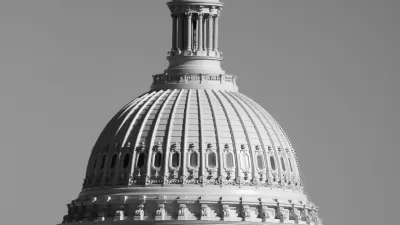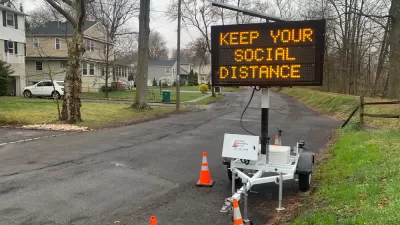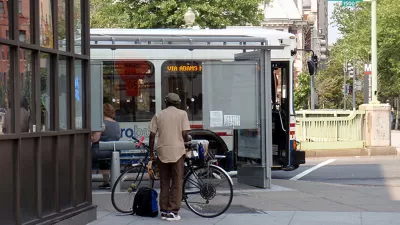Amanda Kolson Hurley surveys the innovative architecture and urban planning transforming America's notoriously stodgy capital into a model of progressive urbanism.
When one thinks of D.C.'s built environment, the first thing to come to mind isn't likely daring architecture or cutting-edge planning. At least partly due to its restrictive zoning and tradition of classically inspired architecture, Washington has long been considered, "one of the most traditional and risk-averse cities in the country," writes Hurley. But a number of recent and planned projects from world-renowned architecture and planning firms are poised to set the city on a different course.
Not surprisingly, in a city that serves as the seat of the federal government and a cornucopia of public institutions, Hurley credits public leadership (and the projects they've commissioned) with facilitating the city's change of ethos.
One example of such leadership is the recently unveiled Sustainable DC effort. "For years, city leaders have been working to shape a different
Washington: dense, diverse, green, and wholly urban in a way that the
Washington of the 1980s and early 1990s-starkly divided by income and
race, and bereft of people downtown after office hours-wasn't. In April,
Mayor Gray unveiled what may be the signature initiative of his
administration, Sustainable DC, which aims to make D.C. the greenest
city in the United States over the next 20 years....Much of the vision
behind Sustainable D.C. comes from Harriet Tregoning, the rock-star
planning director and a founder of the Smart Growth movement."
"The district leadership has actively engaged in urban improvements,
despite the oddness of having all these multiple jurisdictions in
control," says Lionel Lynch, head of the new D.C. office of HR&A Advisors. "They've tried to make sure there's a quality
public realm. You definitely feel that the District is getting its own
identity, or that it's becoming a lot more dominant over the federal
government, in a way that is self-reinforcing."
FULL STORY: Feature> A New Morning in Washington

Maui's Vacation Rental Debate Turns Ugly
Verbal attacks, misinformation campaigns and fistfights plague a high-stakes debate to convert thousands of vacation rentals into long-term housing.

Planetizen Federal Action Tracker
A weekly monitor of how Trump’s orders and actions are impacting planners and planning in America.

In Urban Planning, AI Prompting Could be the New Design Thinking
Creativity has long been key to great urban design. What if we see AI as our new creative partner?

Portland Raises Parking Fees to Pay for Street Maintenance
The city is struggling to bridge a massive budget gap at the Bureau of Transportation, which largely depleted its reserves during the Civd-19 pandemic.

Spokane Mayor Introduces Housing Reforms Package
Mayor Lisa Brown’s proposals include deferring or waiving some development fees to encourage more affordable housing development.

Houston Mayor Kills Another Bike Lane
The mayor rejected a proposed bike lane in the Montrose district in keeping with his pledge to maintain car lanes.
Urban Design for Planners 1: Software Tools
This six-course series explores essential urban design concepts using open source software and equips planners with the tools they need to participate fully in the urban design process.
Planning for Universal Design
Learn the tools for implementing Universal Design in planning regulations.
Gallatin County Department of Planning & Community Development
Heyer Gruel & Associates PA
JM Goldson LLC
City of Camden Redevelopment Agency
City of Astoria
Transportation Research & Education Center (TREC) at Portland State University
Jefferson Parish Government
Camden Redevelopment Agency
City of Claremont





























